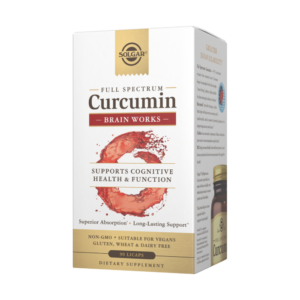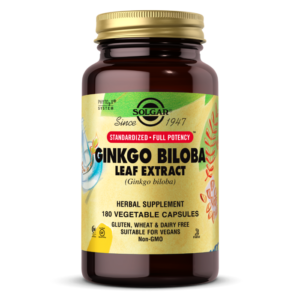Key Takeaways:
- A healthy diet, adequate exercise, mental stimulation, and lots of sleep are all easy lifestyle changes that can help improve your brain health.
- Brain power supplements such as fish oils and ginkgo biloba are also effective in helping to support the structure and function of the brain.
Our brains are the conductors that lead the beautiful, complex orchestra of our bodies. Waking and sleeping, our brains are working 24/7. But how often do we think about our brain health?
Taking care of your mind doesn’t have to be difficult. Below are five easy ways that you can support brain health in your everyday life.
1. Diet
When you eat, you may think about how your food affects your body, but how often do you think about how it affects your brain?
Healthy eating helps keep the mind clear, sharp, and focused. Heavily processed foods and a high-sugar diet often cause a foggy mind. Additionally, nutrient deficiencies may also be associated with brain fog, so it is important to eat a well-balanced diet to attain the nutrients your body needs to stay healthy.
2. Exercise
Have you ever experienced a rush of mental energy after finishing a great workout? It’s a great feeling, and the good news is that these effects on your brain aren’t only short-term – exercise also aids in long-term brain health.
The hippocampus, the part of the brain involved in memory, emotions, and learning, receives a boost during aerobic exercise.1 Daily stress has a negative impact on our moods, causing sleep problems and an inability to concentrate, two problems that aerobic exercise may reduce. The U.S Department of Health and Human Services recommends at least 150 minutes of moderate aerobic activity per week, which is just 30 minutes 5 days per week.
3. Mental Stimulation
In the same way that physical exercises help keep your body strong, mental exercises can do the same thing. Mental stimulation such as reading, doing a puzzle, or following intricate instructions for a task can help support a healthy brain.
In particular, learning a musical instrument has been shown to support brain health. A study conducted on individuals aged 65-80 at the University of South Florida observed the cognitive skills of those who received 6 months of piano lessons compared to a group who did not receive lessons. The group that completed the lessons demonstrated improved ability to plan, process information, and memory.2
4. Supplements
While sleep, exercise, and a healthy diet are the cornerstones of brain health, adding a few select supplements to your daily routine is an easy way to nourish your brain.*
Solgar® Full Spectrum Curcumin Brainworks: Our carefully created Brain Works supplement harnesses the power of full-spectrum curcumin as well as vitamin B12 and choline to support positive cognitive function.* It also contains bacopa, which helps with short-term memory.*
Fish Oils: Fish oil supplements are a source of DHA, naturally found in the brain as part of the cell membranes. These omega-3s help maintain the structure and function of the brain.* Fish oil supplements, such as Solgar®’s Wild Alaskan Full Spectrum™ Omega Softgels, are a source of the important omega-3 fatty acids EPA and DHA. Wild Alaskan sockeye salmon oil is purified to remove heavy metals such as mercury.*
Ginkgo Biloba: Ginkgo biloba assists in maintaining circulatory health and helps support memory, especially occasional mild memory problems associated with aging.* Solgar®’s SFP Ginkgo Leaf Extract can be taken twice daily for optimal brain support.* It integrates the ideologies of traditional herbalism associated with ginkgo biloba, with standardized herbal technology to create a potent, premium-quality herbal extract.
5. Sleep
A good night’s sleep helps you feel more rested, energetic, and focused, while a poor night’s sleep may contribute to feeling fatigued, irritable, and unable to concentrate. Studies indicate that sleep benefits memory, learning, and cognitive performance.
The average adult needs approximately 7-9 hours of sleep per night, while teenagers need about 9.5 hours. To help you prepare for a good night’s sleep, turn down the lights an hour before bedtime, avoid screens, and try to go to bed at the same time each night.
Taking melatonin supplements can also help regulate your sleep-wake cycle. One study in particular found that melatonin increased sleep duration, decreased sleepiness and fatigue, and reduced the amount of time it took subjects to fall asleep.*
Solgar®’s Full Spectrum Curcumin Sleep Ease also promotes relaxation and calm, tranquil rest through its unique blend of GABA to quickly restore mental calmness, plus melatonin, and a special botanical extract to help you fall asleep faster and stay asleep longer.*
GET THE LATEST UPDATES AND EXCLUSIVE DEALS WHEN YOU SIGN UP FOR OUR NEWSLETTER!
Get a head start on brain health
Your mind and body work hand in hand to keep you functioning optimally, so it is important to make sure you’re actively taking care of both. Thankfully, at Solgar® we’ve made brain health easy – click here to shop our premium brain health supplements and get a head start on taking care of your mind.*
*These statements have not been evaluated by the Food and Drug Administration. These products are not intended to diagnose, treat, cure, or prevent any disease.
The information provided on this site is intended for your general knowledge only and is not a substitute for professional medical advice or treatment for specific medical conditions. Always seek the advice of your physician or other qualified healthcare provider with any questions you may have regarding a medical condition. The information on this website is not intended to diagnose, treat, cure or prevent any disease. Never disregard medical advice or delay in seeking it because of something you have read on the Solgar® site.
References





